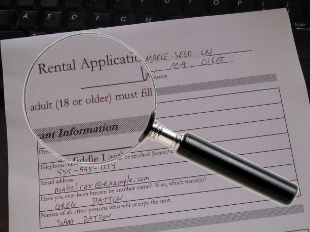5 Things You’re Doing Wrong With Tenant Screening
| . Posted in tenant screening - 9 Comments
Tenant screening is one of the landlord's most valuable tools. A good screening practice ensures that the most qualified applicants get through, while saving you from wasting lots of time waiting for, giving tours to, and negotiating with unqualified applicants. Not all tenants are bad for all rentals. But regardless of what kind of tenant you want, here are five things you're probably doing wrong with tenant screening. (Share with your staff.)

1. You're Waiting Too Long To Say "No"
Your time is valuable. There are many more tenants who want your apartment than will qualify. You need to find out as quickly as possible whether someone is qualified and tell them "no" as soon as you find a reason. This helps the tenant, too. They don't want to waste time with a landlord who's leading them on.
For instance, we recommend a minimum qualification that all applicants combined have total gross income greater than three times the monthly rent. If a tenant calls you, find out how much they make. If they make only twice the monthly rent, tell them "no" right then and there. No tour. No application.
If they smoke and you don't allow smoking, say "no."
If they're being evicted and you don't take tenants with an eviction history, say "no."
If they have more people or more cars than you can legally or safely accommodate, say "no."
Does this mean you need to be rude? Of course not. You can always say, "Oh, I'm sorry, the whole property is non-smoking and it's our policy that we can't proceed with your application."
2. You're Saying Discriminatory Things
A very common question is, "Do you take Section 8?" Part of the reason this is so common is that most landlords wrongly say "No Section 8." That's unlawful! Massachusetts employs "testers," who from time to time make inquiries to enforce this law. It is against Massachusetts law to discriminate against an applicant because they receive public assistance. The answer to "Do you take Section 8?" is always, "Yes, I do."
Realistically you might never have taken Section 8 before. It's safe to admit that. Say, "Well, I haven't used that process before but I'm sure we can figure it out." Usually the tenant is only too happy to connect you with people who can answer your questions.
There are a host of other protected categories.
Q: "Do you rent to gay people?" A: "That's fine, I don't consider sexual orientation on my applicant qualifier." You cannot discriminate on the basis of sexual orientation.
Q: "Do you rent to transgender people?" A: "That's fine, I don't consider gender identity on my applicant qualifier." You cannot discriminate on the basis of gender identity.
Q: "Do you rent to single moms?" A: "That's fine, I don't consider marital status or family status on my applicant qualifier." You cannot discriminate on the basis of marital status or family status (children).
Q: "Do you rent to children under six?" A: "That's fine, I don't consider family status on my applicant qualifier." Even if you have lead paint in the apartment, which constitutes a hazard to children, you cannot refuse to rent to them because of the lead paint. You must use remediation procedures to get a letter of interim control or full deleading compliance.
Q: "I just got back from service in Iraq. Do you rent to veterans?" A: "That's fine, I don't consider veteran status on my applicant qualifier." You cannot discriminate against veterans.
Q: "I have a service dog. Is that okay?" A: If you have a no-animals rule, "That's fine, I just need to verify the animal is necessary." And then use our verification of disability form. You cannot discriminate against emotional or physical disabilities requiring animal support. Read the full verification article, there's more nuance.
Q: "I'm from XYZ country. Do you rent to international people?" A: "That's fine, I don't consider national origin on my applicant qualifier." You cannot discriminate on the basis of national origin.
Q: "I'm deaf and I need a visual smoke alarm installed. Will you rent to me?" A: "That's fine, I don't consider disability on my applicant qualifier." You must make reasonable accommodations, especially if the tenant will pay for a large modification. There's more nuance to this. When in doubt, talk with an attorney.
3. You're Not Keeping a Paper Trail
You might say "no" to someone only to get in trouble for discriminating. You tried to save yourself time but now you have a lawsuit. For instance, you could tell a wounded warfighter that you won't rent to her because she smokes, and the apartment is non-smoking. If she feels that the true reason was that you didn't support her involvement in the war, she could threaten you with a suit for discrimination against veterans.
Your paper trail should start with a clear apartment ad stating the restrictions (e.g., no smoking). You should take notes of every phone call. If you wish to record a call, you may say, before you begin recording, "This call may be recorded or monitored for legal compliance."
Then if you do get threatened with a suit, you can say, "Actually, my paper trail clearly shows the reason for declining this applicant was XYZ. That reason is allowed under the law."
4. You're Afraid To Say "Yes"
Tenant screening sometimes turns into picking a new friend. Don't let it be like that. You don't have to agree with a person's views, like their choice of clothing or have them over for dinner. This is a business relationship, and sometimes really unexpected people will walk into your business with good qualifications.
Your decision should be on the basis of economic qualifications. Also, you should have a reasonable expectation that they will cooperate with you for maintenance and monthly rent payments. Your rental agreement should outline the behaviors you expect and the consequences for non-compliance. Your "gut feel" should be positive, but you can't decide on the basis of gut feel. We recommend a rigorous numerical assessment of each candidate, like our applicant scoring sheet.
5. You're Not Asking the Right Questions
The most important thing is to get the tenant to admit the truth about their situation. No one wants to live a lie, and many people will be only too happy to tell you what's going on in the hopes that you will understand. Maybe you will.
Instead of asking, "Do you have any pets," which creates defensiveness, get in the habit of asking, "How many pets do you have?" The former question implies that "zero" might be the desired answer. The latter question implies that one, two, or seventeen might be allowable. Ask the same question regardless of whether you allow pets.
If a tenant goes on a rant about their current landlord, don't say, "Golly, I guess you're glad to get away from that bad landlord. Instead ask, "Are you being evicted?" Come right out with it. Your business might not weight this factor very heavily. Or it might. Either way, both you and the tenant want to find a place where the arrangement is welcome.
You should also ask, "What kind of recommendation could you get from a previous landlord?" That invites the truth, whereas "Did your previous landlord like you?" invites a "yes." Ask, "Why are you looking to move?" and "How many people will be living with you?" as similar open-ended questions.
So those are the five most common mistakes we see with tenant screening. Do you think you'll change anything in your process? Let us know in the comments below!





